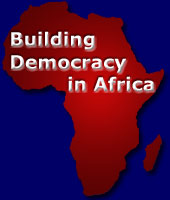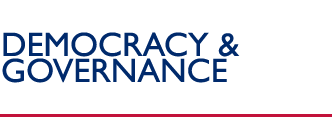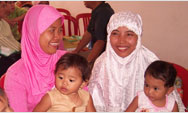Democracy and Governance in Africa

Africa's prospects for a better future continue to brighten as many countries in the region are beginning to reap the benefits of economic policy changes, improved governance and investments in key social sectors undertaken during the past decade. With the rebounding of the global economy, the continued growth of responsible and representative governments and the recovery from several lengthy conflicts, much of the African continent is poised to see more robust economic growth and an improvement in living standards in the years ahead. Testament to the real progress the region has made is reflected in the designation of eight sub-Saharan African countries, out of 16 total, as eligible to benefit from the Millennium Challenge Account (MCA) and the designation of an additional seven as close to the threshold for eligibility. The threshold countries and a number of others farther from eligibility have nonetheless demonstrated steady good performance, worthy of assistance in transformational development under the principles of aid effectiveness. It is these countries that are USAID's focus for transformational development aid in sub-Saharan Africa.
Stability in the region is vitally important to U.S. national security. For the United States, support of African-led efforts to achieve improved livelihoods promotes stability and represents an important long-term investment. Africa has not only a wealth of natural resources of increasing importance to the United States but also represents a growing market for U.S. goods and services.
One of the most promising trends in the region is the resolution of violent conflict which has inhibited economic and social development. The peace in Liberia is holding, a comprehensive Peace Agreement ending the conflict in southern Sudan was signed in January 2005, and Sierra Leone and Angola continue their transition to peace and stability after years of protracted conflict. Unfortunately, conflicts remain unsettled in the Darfur region of Sudan and Cote d'Ivoire and instability persists in the Great Lakes region, although some progress is being achieved.
The policy framework and the program of action adopted by the New Partnership for Africa's Development (NEPAD) is sending a very positive signal to the world that African leadership is increasingly ready to take primary responsibility for economic and social development and improved governance in the region. NEPAD continues to deepen its support among African government leaders and its road map for action is gaining wider credibility. NEPAD is demonstrating through its initiation of peer reviews of political, economic and corporate governance in four countries that Africans are indeed serious about tackling some of their most difficult development issues. Twenty-four countries have now agreed to undergo the process. The United States continues to affirm its endorsement of NEPAD.
Democratic values are deepening and the benefits of responsible governance are becoming more widespread. Civil society is taking fuller advantage of new information and communications technologies to demand accountability from their governments and newly elected leaders in many countries are increasingly serious about reducing endemic corruption. According to Freedom House, a non-governmental organization that tracks democratic processes around the world, the number of free democracies in Africa has almost tripled from four to 11 over the past decade and more than half of the remaining countries in the region are in the transition process toward full and free democracy.
Governance and Peacebuilding Accountability in government, observance of the rule of law, respect for human rights and inclusive political processes strengthen fragile states by mitigating against civil strife and violent conflict as well as promoting reform and recovery. These characteristics of good governance are also critical to advancing USAID's other goals in transformational development, including the consolidation of democracy and market-led economic growth and more effective provision of public services. Good governance, coupled with improved economic well-being and social service delivery, also diminish the appeal of extremist ideologies and terrorist agendas.
There have been recent successes in advancing critical peace processes in sub-Saharan Africa. In January 2005, the Government of Sudan and the Sudan People's Liberation Movement signed a comprehensive peace agreement after more than two years of negotiations. The agreement ends the world's longest-running civil war, and provides for fundamental changes in governance through power-sharing, wealth sharing, security arrangements, and a formal cease fire. Across the border, there have been signs of progress in addressing the 18-year conflict in northern Uganda. The Intergovernmental Authority on Development (IGAD) has achieved several major breakthroughs in efforts to restore peace to Somalia. Other critical peace processes continue. In mid-2004, the Congolese Assembly for Democracy was persuaded to remain engaged with the Transition Government. In Burundi, the Parliament agreed to extend the transition until April 2005 when elections are scheduled. The tragedy in Darfur and instability in Cote d'Ivoire are reminders, nonetheless, that peace can remain fragile.
The United States has played a seminal role in international efforts to assist these processes. USAID is committed to enhancing its immediate response and maintaining a long-term perspective that promotes durable peace. Through the Conflict and Peace Building Fund, begun in 2003, USAID is implementing a multi-faceted approach to strengthen African capacity to manage and mitigate conflict. USAID programs target the root causes of fragility, including economic and political instability, health crises, violent conflict, population movements, displaced populations, and trafficking in persons.
Democratic governance and improved governmental accountability have continued to expand throughout the region, a notable exception being Zimbabwe. USAID programs in democracy and governance have focused on the development of democratic institutions and the rule of law, free and fair political processes, strengthening of civil society, decentralization of governmental functions and improved accountability of both the public and private sectors.
The FY 2006 Program
In FY 2006, USAID will begin a shift to re-orient its programming in sub-Saharan Africa toward aid effectiveness principles, expressed in USAID's White Paper, "U.S. Foreign Aid: Meeting the Challenges of the Twenty-First Century." The region has the highest proportion of fragile states among USAID's assisted regions and a significant number of countries that can be considered to be moving toward "transformational development." Eight countries are MCA eligible and another 11 are low- and middle-income good performers. Adopting aid effectiveness principles, USAID will accordingly initiate a process to increasingly channel its development assistance to African countries that are performing well, demonstrate need and exhibit commitment. If compacts are approved for the MCA-eligible countries, they will see an appreciable increase in their overall USG assistance levels. USAID is therefore not proposing at this time to expand its transformational development programs in these countries. It will, however, continue to address global issues and special concerns, such as HIV/AIDS. Programming in the 11 fragile states in which USAID maintains bilateral programs will be increasingly targeted to address the root causes of fragility. This shift will be formally codified through the adoption of a new Strategic Framework for Africa to be completed in FY 2005.
In FY 2006, USAID proposes to invest $849.4 million in assistance to Africa: 50.4% for transformational development, strengthening fragile states and addressing global issues and special concerns using the Development Assistance (DA) account; 11.2 % for assistance in stability, reform and recovery to Ethiopia and Sudan in FY 2006 through the Transition Initiatives (TI) account; and 38.4% for child survival and health, infections disease reduction and family planning programs through the Child Survival and Health (CSH) account. The TI account is new to USAID Africa's program request in FY 2006. Note: This excludes all funding for HIV/AIDS in Emergency Plan focus countries, which will flow through the Office of the U.S. Global AIDS Coordinator in the Department of State (O/GAC). Of the total DA account funding requested, 45% is proposed to go to transformational development countries (18% to high performers, 26% to good performers, and less than 1% to poor performers); 12% to fragile states, and 43% to regional programs, which address transformational development, fragility or global issues and special concerns through approaches that complement bilateral programs.
Governance and Peacebuilding Weaknesses in democratic governance and factors contributing to fragility inhibit social development and economic growth, can cause civil unrest and provide fertile ground for the rise of extremist ideologies. USAID's efforts to improve democratic governance and promote increased accountability advance the national security goal of creating the conditions for peace and improved security. Governance and peacebuilding efforts address the sources of fragility, promote longer-term development, and complement opportunities offered by the Millennium Challenge Account.
Back to Top ^
|


